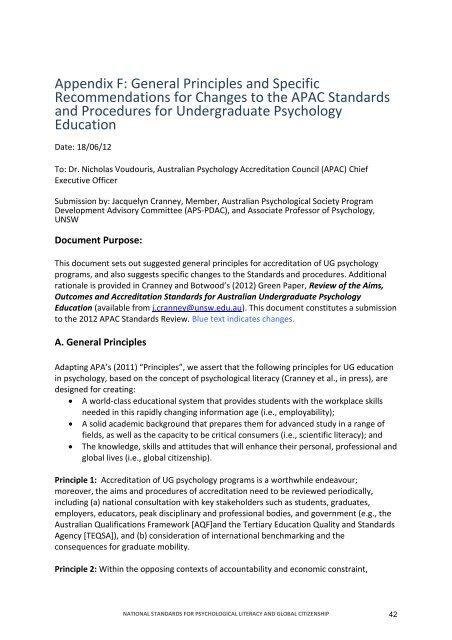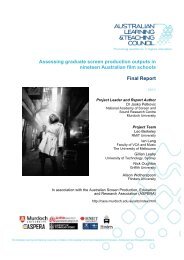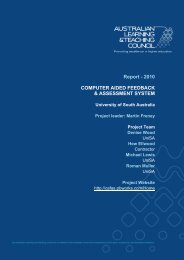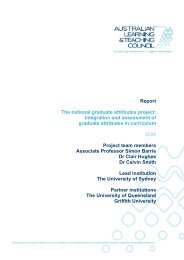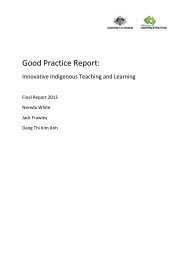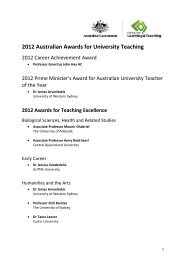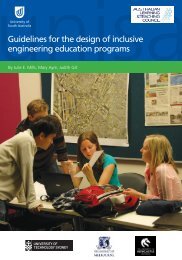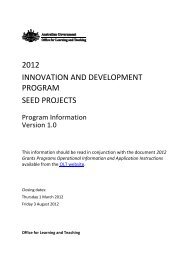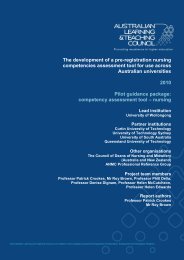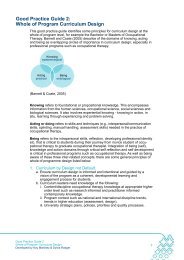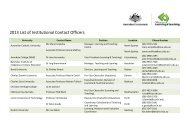national standards for psychological literacy and global citizenship
national standards for psychological literacy and global citizenship
national standards for psychological literacy and global citizenship
Create successful ePaper yourself
Turn your PDF publications into a flip-book with our unique Google optimized e-Paper software.
Appendix F: General Principles <strong>and</strong> Specific<br />
Recommendations <strong>for</strong> Changes to the APAC St<strong>and</strong>ards<br />
<strong>and</strong> Procedures <strong>for</strong> Undergraduate Psychology<br />
Education<br />
Date: 18/06/12<br />
To: Dr. Nicholas Voudouris, Australian Psychology Accreditation Council (APAC) Chief<br />
Executive Officer<br />
Submission by: Jacquelyn Cranney, Member, Australian Psychological Society Program<br />
Development Advisory Committee (APS-PDAC), <strong>and</strong> Associate Professor of Psychology,<br />
UNSW<br />
Document Purpose:<br />
This document sets out suggested general principles <strong>for</strong> accreditation of UG psychology<br />
programs, <strong>and</strong> also suggests specific changes to the St<strong>and</strong>ards <strong>and</strong> procedures. Additional<br />
rationale is provided in Cranney <strong>and</strong> Botwood’s (2012) Green Paper, Review of the Aims,<br />
Outcomes <strong>and</strong> Accreditation St<strong>and</strong>ards <strong>for</strong> Australian Undergraduate Psychology<br />
Education (available from j.cranney@unsw.edu.au). This document constitutes a submission<br />
to the 2012 APAC St<strong>and</strong>ards Review. Blue text indicates changes.<br />
A. General Principles<br />
Adapting APA’s (2011) “Principles”, we assert that the following principles <strong>for</strong> UG education<br />
in psychology, based on the concept of <strong>psychological</strong> <strong>literacy</strong> (Cranney et al., in press), are<br />
designed <strong>for</strong> creating:<br />
A world-class educational system that provides students with the workplace skills<br />
needed in this rapidly changing in<strong>for</strong>mation age (i.e., employability);<br />
A solid academic background that prepares them <strong>for</strong> advanced study in a range of<br />
fields, as well as the capacity to be critical consumers (i.e., scientific <strong>literacy</strong>); <strong>and</strong><br />
The knowledge, skills <strong>and</strong> attitudes that will enhance their personal, professional <strong>and</strong><br />
<strong>global</strong> lives (i.e., <strong>global</strong> <strong>citizenship</strong>).<br />
Principle 1: Accreditation of UG psychology programs is a worthwhile endeavour;<br />
moreover, the aims <strong>and</strong> procedures of accreditation need to be reviewed periodically,<br />
including (a) <strong>national</strong> consultation with key stakeholders such as students, graduates,<br />
employers, educators, peak disciplinary <strong>and</strong> professional bodies, <strong>and</strong> government (e.g., the<br />
Australian Qualifications Framework [AQF]<strong>and</strong> the Tertiary Education Quality <strong>and</strong> St<strong>and</strong>ards<br />
Agency [TEQSA]), <strong>and</strong> (b) consideration of inter<strong>national</strong> benchmarking <strong>and</strong> the<br />
consequences <strong>for</strong> graduate mobility.<br />
Principle 2: Within the opposing contexts of accountability <strong>and</strong> economic constraint,<br />
NATIONAL STANDARDS FOR PSYCHOLOGICAL LITERACY AND GLOBAL CITIZENSHIP 42


